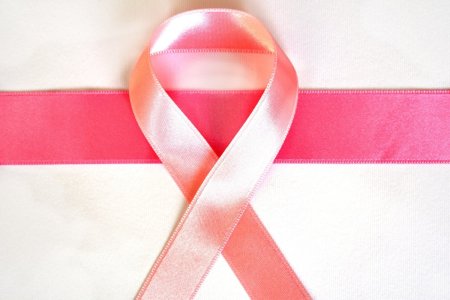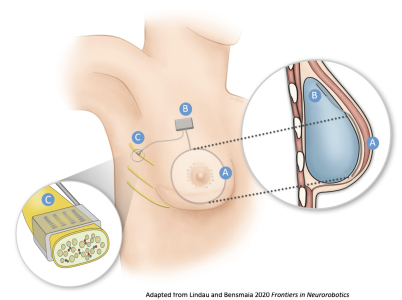Could this new device bring back sensation for mastectomy patients? Find out!
Every day, tens of thousands of women globally are diagnosed with breast cancer.
Despite breast cancer mortality decreasing in Australia since 1994, the recovery process remains challenging.
Many survivors, even with improved reconstructive procedures, experience a loss of chest sensation, affecting their emotional well-being and sexual satisfaction.
However, a revolutionary new device could turn this all around.
In collaboration with the University of Chicago, a team of scientists is currently developing a ‘bionic breast’ designed to restore a sense of touch to breast cancer survivors after a mastectomy or other reconstructive surgery.
Based on work done by the University of Chicago’s Dr Sliman Bensmaia (who sadly passed away in August), the implantable device has two phases: initial masectomy and reconstructive surgery.
First, flexible sensors will be inserted into the chest during the initial mastectomy. Subsequently, they are connected to electrodes positioned under the arms during reconstructive surgery, using either implants or tissues from the woman's body.
When any kind of pressure is placed on the breast—such as during hugging or intimacy—the electrodes send signals to nerves that run between the ribs, which the brain interprets as a sensation.
In Australia, breast cancer is the most common cancer in females, with an estimated 20,500 cases expected in 2023, comprising 28 per cent of female cancer diagnoses.
Mastectomies effectively prevent cancer recurrence but can lead to a sense of physical and existential loss similar to that experienced by amputees.
The technology, inspired by the late Dr Sliman Bensmaia's work, aims to restore a realistic sense of touch to amputees and paralysed patients.
Dr Bensmaia had been dedicated to developing prosthetic limbs before his passing.

Professor of Obstetrics and Gynecology at the University of Chicago Dr Stacy Tessler Lindau has taken on the task of continuing Dr Bensmaia’s work with several biomedical engineers and neuroscientists.
She has stated that restoring feeling to breasts after surgery may not only help the patient physically, but mentally and emotionally as well.
‘Even if their breasts are cosmetically restored, women still have many of the same experiences as a person who loses a limb, like feeling it’s no longer part of their body, total loss of sensation and even pain,’ said the professor.
‘For many people, it’s not just a physical loss, but also a psychological and even existential loss.’
Dr Lindau's ‘bionic breast’ idea stemmed from patient discussions on sexual function loss post-mastectomy.
The team has already received around $6 million AUD grant from the National Institutes of Health to make the device and launch a human trial in patients about to undergo a mastectomy.
If trialled successfully in human subjects, the device is expected to be approved and turned into a helpful form of treatment for all breast cancer survivors.

Members, what do you think of this story? Share your views in the comments below!
Despite breast cancer mortality decreasing in Australia since 1994, the recovery process remains challenging.
Many survivors, even with improved reconstructive procedures, experience a loss of chest sensation, affecting their emotional well-being and sexual satisfaction.
However, a revolutionary new device could turn this all around.
In collaboration with the University of Chicago, a team of scientists is currently developing a ‘bionic breast’ designed to restore a sense of touch to breast cancer survivors after a mastectomy or other reconstructive surgery.
Based on work done by the University of Chicago’s Dr Sliman Bensmaia (who sadly passed away in August), the implantable device has two phases: initial masectomy and reconstructive surgery.
First, flexible sensors will be inserted into the chest during the initial mastectomy. Subsequently, they are connected to electrodes positioned under the arms during reconstructive surgery, using either implants or tissues from the woman's body.
When any kind of pressure is placed on the breast—such as during hugging or intimacy—the electrodes send signals to nerves that run between the ribs, which the brain interprets as a sensation.
In Australia, breast cancer is the most common cancer in females, with an estimated 20,500 cases expected in 2023, comprising 28 per cent of female cancer diagnoses.
Mastectomies effectively prevent cancer recurrence but can lead to a sense of physical and existential loss similar to that experienced by amputees.
The technology, inspired by the late Dr Sliman Bensmaia's work, aims to restore a realistic sense of touch to amputees and paralysed patients.
Dr Bensmaia had been dedicated to developing prosthetic limbs before his passing.

Breast cancer ranks as the second most diagnosed cancer in Australia for individuals aged 20 to 39 and 60 to 79, and the most diagnosed cancer for those aged 40 to 59. Image source: Pixabay
Professor of Obstetrics and Gynecology at the University of Chicago Dr Stacy Tessler Lindau has taken on the task of continuing Dr Bensmaia’s work with several biomedical engineers and neuroscientists.
She has stated that restoring feeling to breasts after surgery may not only help the patient physically, but mentally and emotionally as well.
‘Even if their breasts are cosmetically restored, women still have many of the same experiences as a person who loses a limb, like feeling it’s no longer part of their body, total loss of sensation and even pain,’ said the professor.
‘For many people, it’s not just a physical loss, but also a psychological and even existential loss.’
Dr Lindau's ‘bionic breast’ idea stemmed from patient discussions on sexual function loss post-mastectomy.
The team has already received around $6 million AUD grant from the National Institutes of Health to make the device and launch a human trial in patients about to undergo a mastectomy.
If trialled successfully in human subjects, the device is expected to be approved and turned into a helpful form of treatment for all breast cancer survivors.
Key Takeaways
- Scientists are developing a ‘bionic breast’ device that could restore sensory touch in breast cancer survivors who undergo mastectomies.
- The device uses flexible sensors to send signals to the brain and interpret it as a sensation when the breast is placed under pressure, like a hug or during intimacy.
- The sensor device is aimed to be flexible like human tissue and compatible with the immune system so it can remain in the woman's body for her lifetime.
- The National Institutes of Health gave the research team a $4 million grant to create the device and launch human trials.







